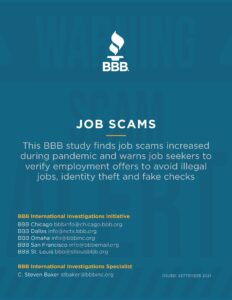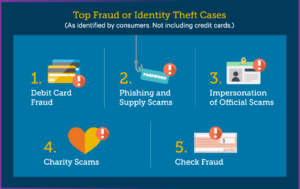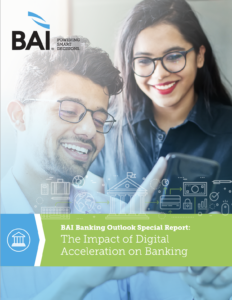Blog Post
In case you missed it, over the past month, we have published incredible content on our OrboNation Blog and Modernizing Omnichannel Check Fraud Detection. Review the latest OrboNation Newsletter online or via PDF download.
Read MoreThe Better Business Bureau has released a study that shows an increase in job scams during the COVID-19 pandemic. As reported in The Augusta Chronicle: The in-depth investigative study finds job scams increased during the pandemic, and warns job seekers to verify employment offers to avoid illegal jobs, identity theft and fake checks, some of the many forms employment fraud takes and the scams that often result. Read the full study at BBB.org/jobscams.
Read MoreIs your organization lagging behind in fraud detection and prevention tools? Waiting for a fraud event can cost more than pre-emptive fraud prevention Fraud prevention tech is not a DYI proposition In his always-entertaining Frank On Fraud blog, Frank McKenna takes a look at businesses that are struggling to get the fraud tools and technology…
Read MoreMastercard Inc. solidifies its participation in cryptocurrency Crypto fraud has steadily increased Banks will need to be aware of inevitable crossover fraud Digital Transactions, true to its name, reported a literal digital transaction as Mastercard Inc. announced last week its acquisition of CipherTrace Inc., a 6-year-old company specializing in technology to combat money laundering and…
Read MoreIt’s valuable to know how criminals and fraudsters think Some criminal traits are actually admirable when redirected AI and ML detect criminal tactics and habits that human observation can overlook Business Innovation Brief offers some streetwise advice: If you want to stop fraud activity, you have to think like a criminal. They also go one…
Read MoreIn case you missed it, over the past month, we have published incredible content on our OrboNation Blog and Modernizing Omnichannel Check Fraud Detection. Review the latest OrboNation Newsletter online or via PDF download.
Read MoreIn a digital world, check fraud still leads the pack There are common “ingredients” to each fraud “recipe” Consumers can protect themselves Joshua Riggins, president of Farmers and Mechanics Federal Savings Bank, makes no bones about it in an article for the Greene County Daily World: Even in the rapidly expanding world of digital finances,…
Read MoreCommunity banks and credit unions are at a disadvantage. Their lack of necessary internal resources and budget to upgrade their systems and integrate new technologies compared to big banks leads to gaps in fraud coverage, automation capabilities, and outdated systems. These gaps are perilous when almost all industry numbers indicate check fraud is on the rise. Meanwhile, the banking industry is more competitive than ever as new fintech companies like Chime, Brex, and Acorn hit targeted markets. Community banks and credit unions also perform much more manual work compared to these new fintech companies.
Read Moreinfographic examining the current state of fraud in banking. Their research reveals that the #1 digital banking concern — regardless of generation — is fraud.
Read MoreBAI Banking Outlook has made available an informative publication called The Impact of Digital Acceleration on Banking, based upon a survey of 600 consumers and 200 leaders of financial services organizations.
Read More






